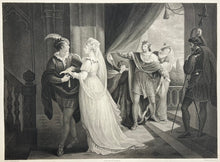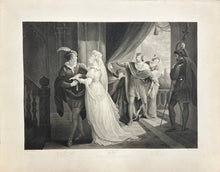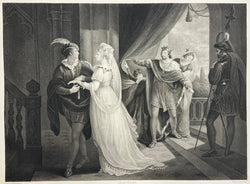William Hamilton. Plate 90. “Cymbeline, Act I, Scene ii. Cymbeline’s Palace in Britain. Imogen, Posthumus, Cymbeline, Queen...” From The American Edition of Boydell’s Illustrations of Shakespeare, Restored to all the Pristine Beauty of the First Proofs.
New York: S. Spooner, 106 Liberty St., 1852. ca. 17 1/2 x 23 ½ (image). Engraving by Thomas Burke. Repaired tear in bottom margin. Very good condition.
A print from a magnificent series of British based works of William Shakespeare published by the great John Boydell. Boydell, a land surveyor in the employment of his father, was inspired by an engraving by W.H. Toms to leave his home in Shropshire about 1750 and walk to London to apprentice himself to Toms. After six years, Boydell set up his own shop and began his career as a print publisher. He was much concerned with the French dominance of the European print market at mid-century, and mostly by his efforts in the 1780s Britain became a print exporting country.
As part of his concern with making a profit and supporting British art, Boydell established the Boydell Shakespeare Gallery, an establishment dedicated to British paintings depicting scenes from Shakespeare’s plays. Boydell commissioned the paintings, put them on display in the gallery, and then published a folio work consisting of commissioned prints after 100 of the paintings in the gallery. Each print is expertly engraved and powerfully expresses the artistic inspiration that the subject provided. In 1852, the original Boydell plates were purchased and re-engraved by Spooner.
These are fascinating artistic expressions of the then current gothic interpretation of Shakespeare’s works. The gallery and the prints were a boon for British artists, giving them inspiration and publicity at the same time. As almost all the paintings have since disappeared, the prints take on added interest as the surviving record of this fascinating episode in British art history.





